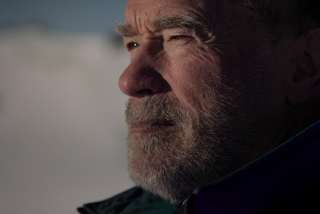Life of Churchill demands attention
- Share via
He was part Schwarzenegger and part Napoleon, a real-life action hero driven by unbridled ambition and a keen political mind.
Winston Churchill -- soldier, adventurer, politician, author, husband and father -- lived a life of dizzying ups and downs. Born at the height of the British Empire, his death coincided with its demise.
No wonder the documentary “Churchill” (8 tonight on KCET), narrated by Ian McKellen, takes three hours to explore the history and myth of one of the 20th century’s most remarkable politicians. Though some may find the exhaustive format, which plays like an autobiography read aloud, a chore at times, filmmakers Lucy Carter and Stewart Binns weave a rich account that becomes increasingly addictive with each new chapter in Churchill’s story.
Described as a “young man in a hurry,” Churchill knew he was destined for greatness. He asserted that he would one day be prime minister, and when playing soldiers with friends, he insisted on being called “General.”
After embarking on the military career his aloof father had planned for him, Churchill gunned for medals and got them, setting the stage for the political success he craved. In 1900, at age 26, he was elected to Parliament, launching a controversial 55-year political career as a Conservative turned Liberal turned Conservative again.
As prime minister during World War II, Churchill rallied his nation with rousing speeches and made one agonizing decision after another. He was seen by many as the main architect of Allied victory.
But Churchill never quite achieved peace with himself, and after he lost power in the 1945, he grew frustrated and bored, prone to thunderous bad moods.
He rallied himself and regained power in the 1950s, but after failing to broker peace between the U.S. and the Soviets, Churchill’s health deteriorated and he was forced to resign.
At the end of his life, Churchill considered himself a failure who couldn’t stop the decline of the British Empire and the onset of the Cold War. He was beloved by many and despised by others, but no one, including himself, ever doubted his resolve.
More to Read
Only good movies
Get the Indie Focus newsletter, Mark Olsen's weekly guide to the world of cinema.
You may occasionally receive promotional content from the Los Angeles Times.








